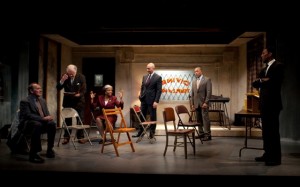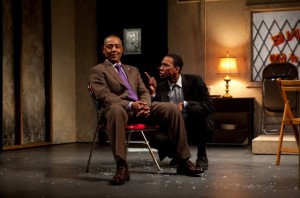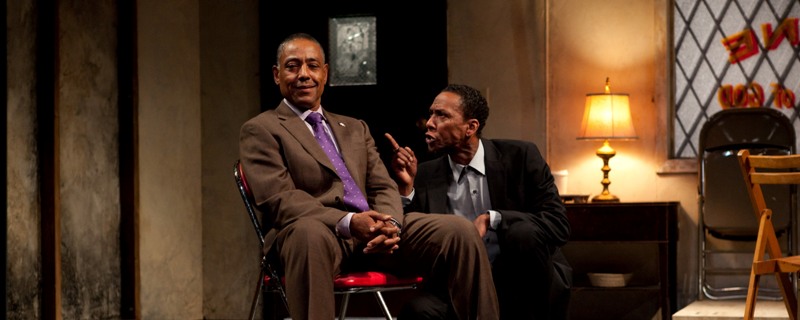
Zach Grenier, Bob Dishy, Tonya Pinkins, Jordan Lage, Giancarlo Esposito and Ron Cephas Jones in Atlantic Theater Company's world premiere of STOREFRONT CHURCH, written and directed by John Patrick Shanley. Opening June 11, 2012 at the Linda Gross Theater (36 West 20th Street). (Photo credit: Kevin Thomas Garcia)
The stripping away of pretense can lead to frightening self-revelations, but it can just as often lead to a wanderer’s fear: all the certainty of direction is gone, leaving only meandering in the dark. Perhaps the strongest unifying thread of John Patrick Shanley’s CHURCH AND STATE trilogy, the stripping of creed and conviction is examined most fully in the trilogy’s powerful final installment, STOREFRONT CHURCH, produced by the Atlantic Theater Company. Promising neither answers nor certainty, STOREFRONT CHURCH forces its characters to scrutinize all that seems so straightforward in their lives and, in the process, asks us to interrogate our own convictions in the power of money, faith, and happiness.
The play’s focus is Donaldo Calderon, the ambitious Bronx borough president, beset by duties to family, constituents, friends, office, faith, and self. Jessie Cortez, a Bronx resident and longtime Calderon family friend, faces foreclosure for being behind on her mortgage, and seeks Donaldo’s help in wooing some leniency from the bank. Involved in a real estate development project with the same bank, Donaldo initially refuses for fear of impropriety, only to be swayed when he learns that his mother cosigned the loan on which Jessie is so far in arrears. That loan, we discover, was for Jessie to finance the opening of a small storefront church for Reverend Chester Kimmich, a Hurricane Katrina refugee whose calling brought him to the Bronx. Trouble is, Reverend Kimmich refuses to hold services in the face of his own spiritual crisis, and therefore makes no money to pay Jessie back for the loan. Donaldo thus finds himself between the rock of home and community, and the hard place of office and politics. Unexpectedly to Donaldo, he is soon joined in this cramped space by the haunting influence of Reverend Kimmich.
Stories of the church (or the orphanage or the community center or whatever) versus the bank and the developers are cliché enough by this point, but STOREFRONT CHURCH resists such easy polarities. At stake here is not the little guy versus the machine, but the soul of a community leader and those who look to him for guidance. We meet Donaldo along the path of a promising political career, having already made a series of decisions and sacrifices in order to accelerate himself to this position. He begins the play at peace with who he is and where he is going, but that is before he enters the crucible stoked by Reverend Kimmich, Jesse Cortez, and bank CEO, Tom Raidenberg.
Shanley’s CHURCH AND STATE trilogy began with the highly lauded DOUBT, and moved through DEFIANCE to its fitting conclusion in the non-closure of STOREFRONT CHURCH. Beyond denying convenient alliteration, and taking over the show’s directorial duties himself, Shanley’s most striking direction change here is critiquing society rather than institutions. Neither the Catholic Church nor the United States military fares well in either of this trilogy’s previous installments, but STOREFRONT CHURCH’s critique is aimed at the many assumptions society takes for granted, in particular those uncritical of the connection between money, progress, and the common good. Donaldo the politician has committed himself to the promise of that equation, but STOREFRONT CHURCH will force him to test the strength of his conviction.
With a small ensemble of six, STOREFRONT CHURCH pulsates to vivid life on the strength of a commanding cast. As Donaldo, Giancarlo Esposito excellently shoulders his burden of embodying the play’s themes most directly. His character may seem a bit too self-assured at first, but it is all in service of the conflicted and spiritually embattled figure he will become. Donaldo’s journey is convincingly precipitated by Ron Cephas Jones’s mysterious and haunting Reverend Kimmich. With a baritone perfectly suited to a southern preacher, Jones vividly portrays Kimmich’s spiritual bewilderment, allowing the character both to influence the play’s conflict, and be affected by the human struggles he encounters in his new ministry. Esposito and Jones close the first act with a dazzling agon that makes clear how little STOREFRONT CHURCH is interested in platitudes or solutions: both men leave the scene more bewildered than they entered, if perhaps with a sense that their journeys coincide more than they had realized hitherto.

Giancarlo Esposito and Ron Cephas Jones in Atlantic Theater Company's world premiere of STOREFRONT CHURCH, written and directed by John Patrick Shanley. Opening June 11, 2012 at the Linda Gross Theater (336 West 20th Street). (Photo credit: Kevin Thomas Garcia)
For fear of painting STOREFRONT CHURCH as an evening of heavy philosophical debate, let me make clear: the play is quite funny in many places. Those who know Shanley’s work only from DOUBT should remember that this is the same writer and director behind the 1990 Tom Hanks film JOE VERSUS THE VOLCANO. The bulk of STOREFRONT CHURCH’s laugh lines belong to Bob Dishy’s Ethan Goldklang, the Jewish husband of the Hispanic Jessie Cortez who feels the whole mortgage problem could be solved with a little human understanding. Dishy’s character may tread at times a bit too closely to one more suited to OLD JEWS TELLING JOKES, but the veteran actor retains for Ethan a consistent humanity that turns to humor because he recognizes the ridiculousness of it all. The show’s funniest line and most surprising character development, however, belong to Zach Grenier’s Reed Van Druyton, a mundane loan officer with little interest in anything beyond regulations and paperwork. Grenier impressively shows us this character emerging from a cocoon, if not necessarily into a butterfly, at least into a character that recognizes that there might be something beautiful about butterflies.
Bringing his CHURCH AND STATE trilogy to a close, Shanley shows that in the wake of institutions like the church, military, or bank proving themselves unreliable in the face of so much rhetoric, the burden for a functioning society falls to the diverse people who share the space of community. STOREFRONT CHURCH looks with insight and compassion at the difficult process of realization that comes with turning away from icy conviction and toward the lifeblood of other people. Go see STOREFRONT CHURCH and, despite the refrain of that familiar spiritual sung several times over the course of the play, you shall be moved.
STOREFRONT CHURCH
Written and Directed by John Patrick Shanley
May 16 – July 1, 2012
The Atlantic Theater Company
Linda Gross Theater
336 W. 20th Street
New York, NY, 10011
212-691-5919
http://www.atlantictheater.org/


